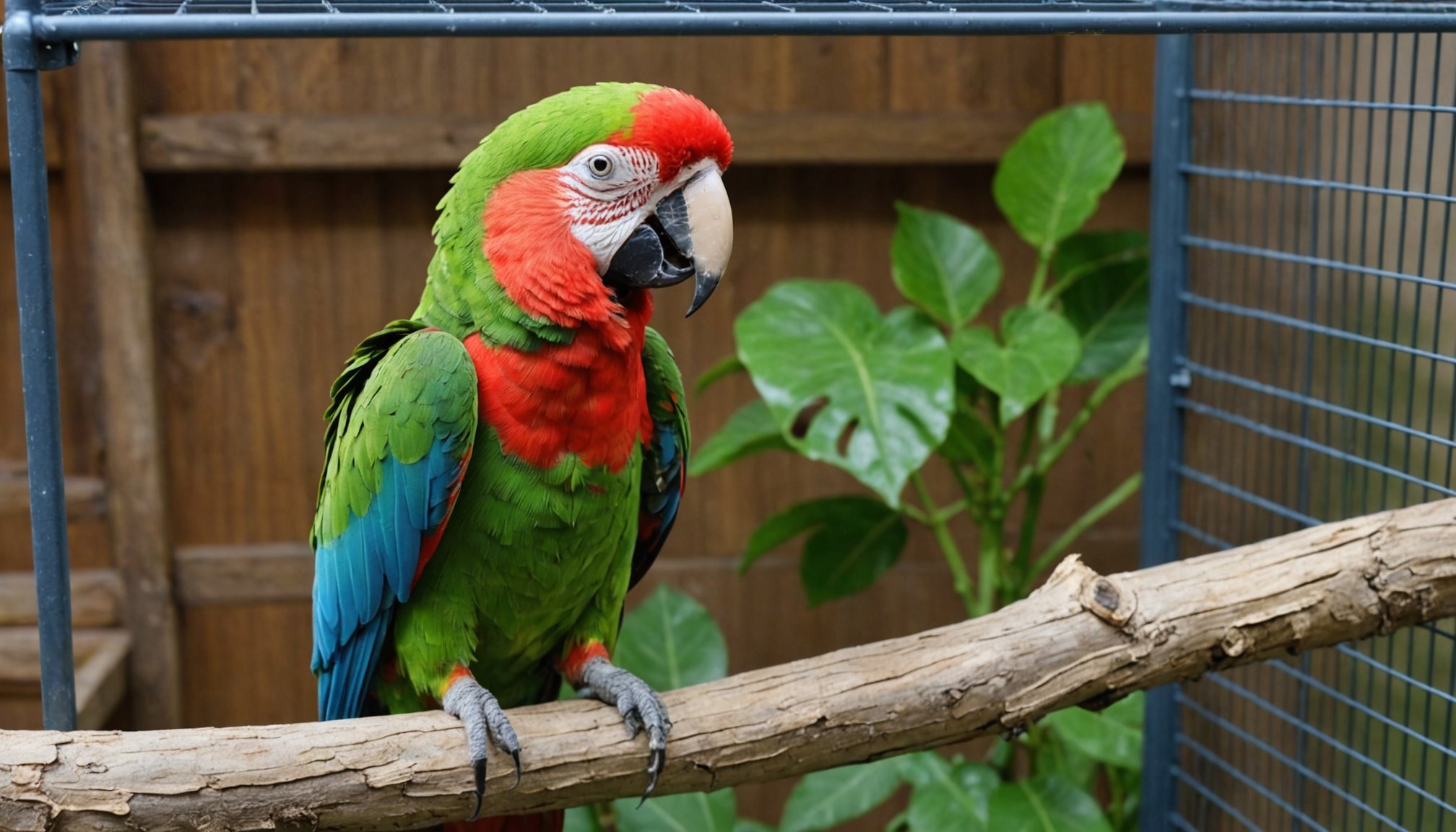Habitat Setup for Your Solo Pet Parrot
Creating the perfect habitat setup for your solo pet parrot involves thoughtful planning. The parrot cage design is crucial to ensure comfort and safety. Choosing the right cage size means providing ample space for the bird to spread its wings, as parrots require freedom for physical movement. Cage material is equally important; opt for bird-safe materials like stainless steel, which are durable and non-toxic, to prevent any health hazards.
Positioning the cage in your home plays a significant role in your parrot’s daily life. Place the cage in an area with good lighting that encourages interaction, but avoid locations that have direct sunlight or drafts. This will ensure your parrot feels secure and part of the household environment without being overwhelmed.
Also read : Creating a safe and enriching habitat for your small rodents: tips and ideas
Incorporating elements like perches, swings, and toys enable physical activity and mental stimulation. These additions cater to their natural instincts and provide enrichment. It’s beneficial to combine different textures and shapes in these accessories to keep your parrot engaged. Regularly changing toys and setup helps prevent boredom, keeping their environment dynamic and inviting. Remember, a thoughtful habitat setup is key to your parrot’s happiness and well-being.
Enrichment Activities to Engage Your Parrot
Maintaining a stimulating environment is crucial for your parrot’s well-being. Parrot enrichment involves providing activities that cater to their natural instincts and intelligence. Consider offering a variety of interactive toys to promote mental stimulation and prevent boredom. Rotating these toys regularly keeps the environment fresh and engaging, ensuring your parrot remains interested.
Also to see : Welcoming a kitten: your ultimate guide to blending cats and dogs in a happy home
Types of Interactive Toys
Different kinds of interactive toys serve various enrichment purposes. Puzzles and foraging toys challenge their problem-solving skills, while mirrors and bells can entertain with their reflective and auditory features. Always choose items made from bird-safe materials to avoid health risks.
DIY Enrichment Ideas
Creating enrichment activities from household items can be cost-effective and fun. Use untreated cardboard boxes or paper towel rolls to hide small treats, encouraging natural foraging instincts. A simple string of wooden beads can mimic nuts, which your parrot will enjoy manipulating.
Adding these enrichment strategies into your parrot’s daily routine not only enhances their cognitive abilities but also strengthens your bond. Regular engagement through play and exploration supports a happier and healthier life for your feathered friend.
Diet Considerations for Optimal Health
Ensuring parrot nutrition is crucial for your pet’s health and longevity. A balanced diet includes a variety of seeds, pellets, fruits, and vegetables to provide essential vitamins and minerals. Offering a diverse range of foods caters to their dietary needs and prevents nutritional deficiencies. It’s important to understand that not all human foods are safe for parrots. Avoid giving them chocolate, caffeine, or avocado, as these can be toxic.
Developing a thoughtful feeding schedule helps mimic their natural foraging behaviour. Distributing meals throughout the day encourages activity, allowing parrots to enjoy their food in a manner similar to how they would in the wild.
For optimal health, incorporate high-quality parrot pellets as a staple in their diet, supplemented by fresh fruits and vegetables. Pellets are specially formulated to ensure balanced nutrition. Rotate food items regularly to keep their diet interesting and prevent boredom.
Implementing a varied diet enhances both their physical health and cognitive function. Observing your parrot’s preferences and adjusting portions accordingly supports a healthier lifestyle. Always ensure access to clean water and monitor their eating habits for signs of illness.
Social Interaction and Bonding Activities
Establishing a strong bond with your parrot enhances their social well-being. Parrot socialization is crucial, allowing pets to feel secure and connected. Engage in daily interaction to nurture emotional health. Regular communication ensures parrots receive the attention they need.
Training is an exciting way to improve communication and understanding. Techniques such as clicker training can teach parrots new tricks and signal reinforcement. Start with simple commands, gradually increasing complexity as your bird becomes more comfortable. Training sessions stimulate cognitive abilities, providing mental enrichment.
Incorporate bonding activities into your daily routine to nurture your relationship. Consider playtime with your parrot outside of their cage. Use toys they enjoy, or introduce gentle grooming to build trust. Simple actions like scratching their head or gently touching their beak can create positive associations, reinforcing your bond.
Encourage playfulness and exploration by communicating with your parrot through songs and chatter. Use an amiable tone, as parrots are sensitive to vocal inflections. Mimicking sounds can become an engaging game, supporting both your bond and their cognitive development. By investing time in these activities, you lay the foundation for a loving, reciprocal relationship.
Common Challenges and Solutions
Caring for a solo pet parrot can present some unique parrot care challenges, particularly around stress and boredom. Identifying behavioural changes such as excessive squawking, feather plucking, or changes in eating habits can indicate underlying stressors. It is vital to address these signs early to prevent escalations.
Problem-solving starts with understanding the root causes of these behaviours. Often, issues stem from unmet needs for social interaction or environmental enrichment. Ensuring your parrot’s habitat is richly stimulating with interactive toys, perches, and routine social interaction can alleviate many challenges. Regularly rotating toys introduces new stimuli, reducing chances of repetitive stress behaviours.
Behavioral issues can also arise from inconsistent routines. Establishing a consistent daily schedule helps parrots feel secure and predict their environment. This includes regular feeding times, play sessions, and interaction periods. Setting aside time for communicative activities, such as training or gentle bonding tasks, supports mental engagement and emotional health.
Creating a stable, enriched environment with well-established routines can greatly enhance your parrot’s well-being, effectively addressing and mitigating these common complications. Thus, by anticipating and promptly responding to your parrot’s needs, you foster a harmonious living space.





